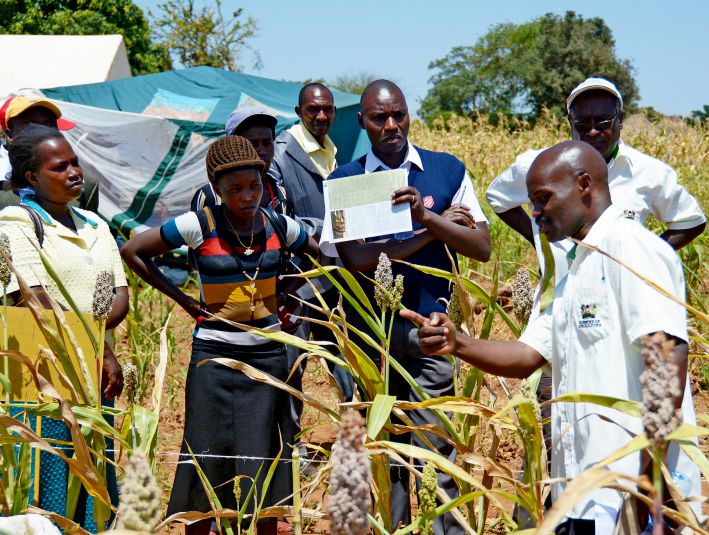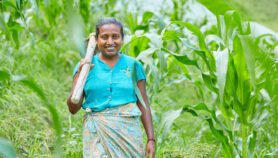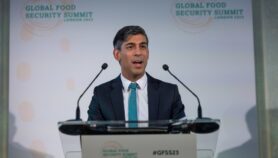Send to a friend
The details you provide on this page will not be used to send unsolicited email, and will not be sold to a 3rd party. See privacy policy.
Agricultural systems are changing. They need knowledge networks, not independent brokers, says Benjamin Kwasi Addom.
Agricultural extension services are part of most countries’ rural administrative structure, helping to deliver information and development projects. For decades, they have taken on an intermediary role within the networks of organisations and individuals creating and managing new agricultural resources — loosely called agricultural innovation systems (AIS).
Agricultural extension agents routinely communicate researchers’ new knowledge and innovations to farmers to help improve agricultural production. In essence, they have been knowledge brokers — mediating between those who produce knowledge and those who need it, and sometimes repackaging or adding value to existing knowledge on specific topics.
But AIS are becoming more complex: agricultural processes and stakeholder demands are changing and information technologies are becoming more prominent. This has brought new challenges, such as rising costs, widening the gap between those who have new knowledge and those who need it.
Filling the gap
Many independent intermediaries — from the private sector, NGOs, research institutes or farmers themselves — have emerged to fill the knowledge gap. But, despite good intentions, their independent efforts are not enough. Closing the gap requires partnership and coordination.
In reality, intermediaries mostly duplicate each other’s work. Instead, they should be working as well-coordinated components of a process, each with a specific mandate.
Public sector providers, for example, are closest to the ‘end users’ and should concentrate on this strength to better understand farmers’ needs. NGOs should then focus on the supply of services to meet those needs — in close coordination with the public sector — by looking to cement networks and ensure that knowledge services are provided effectively. And the private sector’s entrepreneurial, result-oriented, and creative capacities justify a focus on taking the lead to create and identify new innovations.
This is what knowledge brokering should be about — a set of clearly defined and linked activities performed either by individuals or organisations to facilitate co-creation and sharing of knowledge.
‘One broker’ doesn’t work
I believe that no one organisation or individual can efficiently undertake all the activities involved in AIS knowledge brokering. It requires networks of experts and it requires complex partnerships — something that the international development sector tends to avoid.
Since such partnerships rarely exist, research institutes often take on the task of providing extension and advisory services specified in their grants. In most cases they are not willing to work with extension specialists or institutions.
But it’s not just research institutes that have taken on this role. IT experts, who should concentrate on developing new ICT innovations, have also begun to deliver extension services to farmers.
Most of these intermediaries have identified a knowledge gap and a potentially useful innovation or technology that could help bridge it. But either they cannot identify the right partners to take their innovations to the farmers, or they see extension work as an opportunity to generate revenue even though they have little or no experience in this field.
This trend brings real consequences. I have seen farmers overburdened with daily questionnaires and conversations, sometimes for projects that duplicate previous work.
Who should do what?
A stockbroker may understand financial markets, just as a real estate broker knows the housing market and a power broker can influence people to lean towards a particular ideology. But knowledge brokering within international development should be construed differently.
The complexity of systems such as the AIS means there are distinct roles for different individuals and institutions. This should be reflected in how knowledge brokering is practised: partnerships, rather than individual brokering, will have better impact.
This can be done in a number of ways. Firstly, I strongly believe that donors and investors need to be more strategic when supporting the implementation stage of projects.
The Netherlands Space Office’s (NSO) initiative on Geodata for Agriculture and Water (G4AW) is an excellent example of how knowledge brokering roles can be nurtured effectively. The NSO has invested over 30.5 million Euros into agricultural systems in selected countries across Africa and Asia. And it has made complementary partnerships a requirement so that for each project, appropriate expertise and experience are combined along the journey from data to knowledge to extension service.
Other funders should follow this lead and evaluate partnerships based on how the members complement each other and how they contribute to the overall knowledge brokering process.
Secondly, policy and decision makers in countries requesting international development assistance need to learn to say ‘no’ to independent, isolated, disconnected and fragmented development projects that duplicate (and waste) effort. If there are policies and regulations that detail the requirements and guiding principles for implementing projects, fewer organisations will reach out to end users alone. Instead, they will be encouraged to join hands with others and build on on-going activities.Thirdly, AIS complexity means that ICTs and knowledge management should be recognised as critical components of every activity or project that aims to take innovation to farmers’ fields. ICT and mobile applications are making knowledge brokers’ engagement with rural farmers easier, faster and cheaper. And they are making partnerships easier to manage.
Benjamin Kwasi Addom is a programme coordinator working on ICTs for agriculture at the Technical Centre for Agricultural and Rural Cooperation (CTA), the Netherlands. He can be contacted at [email protected] and on Twitter @tordeben














